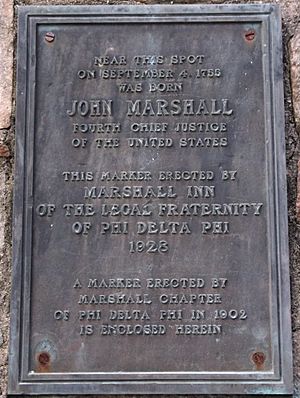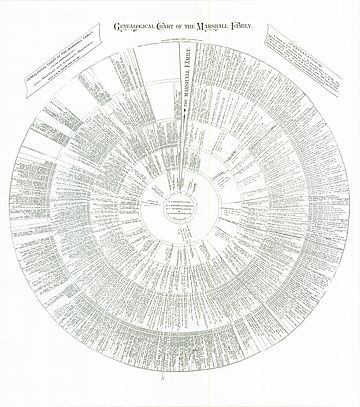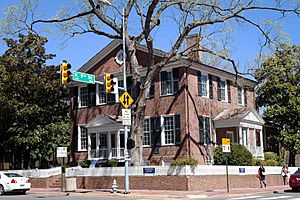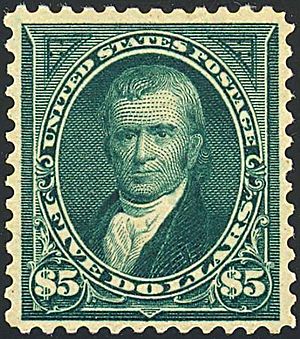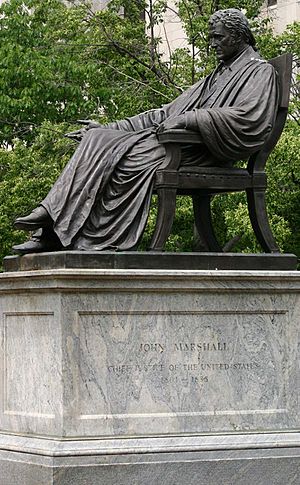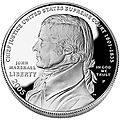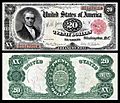John Marshall facts for kids
Quick facts for kids
John Marshall
|
|
|---|---|
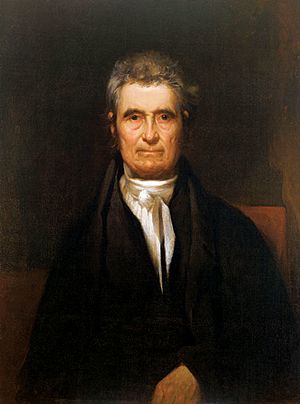 |
|
| 4th Chief Justice of the United States | |
| In office February 4, 1801 – July 6, 1835 |
|
| Nominated by | John Adams |
| Preceded by | Oliver Ellsworth |
| Succeeded by | Roger B. Taney |
| 4th United States Secretary of State | |
| In office June 13, 1800 – February 4, 1801 |
|
| President | John Adams |
| Preceded by | Timothy Pickering |
| Succeeded by | James Madison |
| U.S. Representative from Virginia | |
| In office March 4, 1799 – June 7, 1800 |
|
| Personal details | |
| Born | September 24, 1755 Germantown, Virginia |
| Died | July 6, 1835 (aged 79) Philadelphia, Pennsylvania, U.S.A. |
| Political party | Federalist |
| Spouse | Mary Willis Ambler |
| Profession | Lawyer, Judge |
| Military service | |
| Branch/service | Culpeper, Virginia Militia |
| Rank | Captain |
| Battles/wars | American Revolutionary War |
John Marshall (born September 24, 1755 – died July 6, 1835) was an important American statesman and judge. He played a huge role in shaping American constitutional law. He also made the Supreme Court much more powerful.
Marshall served as the Chief Justice of the United States from February 4, 1801, until his death in 1835. Before that, he was a member of the United States House of Representatives from 1799 to 1800. He also worked as the Secretary of State for President John Adams from 1800 to 1801. Marshall was from Virginia and was a leader of the Federalist Party.
He was the longest-serving Chief Justice in Supreme Court history, leading the Court for 34 years. He was key in developing the American legal system. His most important contribution was creating judicial review. This is the power of the courts to decide if a law goes against the Constitution. If it does, the law can be stopped. Marshall is often called the person who made the judicial branch (the courts) a special and strong part of the government. He also helped balance power between the federal government and state governments. He made sure federal law was more powerful than state law.
Contents
How John Marshall Led the Supreme Court
When John Marshall became Chief Justice, he changed how the Supreme Court announced its decisions. Before him, each judge would write their own separate opinion. This was called a seriatim opinion. It was common in Virginia and is still done in countries like the United Kingdom and Australia.
Under Marshall, the Supreme Court started releasing a single, clear opinion for most cases. This made the Court's decisions easier to understand and follow. Since Marshall almost always wrote this main opinion, he became the main voice for the Court in important cases. He also ended the tradition of judges wearing fancy powdered wigs and red robes, which they had copied from British judges.
John Marshall's Family Life
John Marshall came from a well-known family in Virginia. He was a distant cousin to other important people, including a U.S. Senator and a Civil War colonel.
On January 3, 1783, Marshall married Mary Willis "Polly" Ambler. They had ten children together, but only six of them lived to be adults. Their children were:
- Thomas (1781–1835)
- Jaquelin Ambler (1787–1852)
- Mary (1795–1841)
- John James (1798–1833)
- James Keith (1800–1862)
- Edward Carrington (1805–1882)
In 1831, when he was 76, Marshall had surgery in Philadelphia, Pennsylvania, to remove bladder stones. Later that year, his wife Polly passed away. In June 1835, Marshall went back to Philadelphia for more medical help. He died there on July 6, at the age of 79. He had been Chief Justice for more than 34 years.
A famous story says that the Liberty Bell cracked when it was rung after his death. It was never rung again after that. His body was brought back to Richmond, Virginia, and buried next to Polly's in Shockoe Hill Cemetery.
John Marshall was one of the last Founding Fathers still alive. He was also the last surviving member of President John Adams's cabinet. In December 1835, President Andrew Jackson chose Roger Taney to take Marshall's place as Chief Justice.
Places and Things Named After John Marshall
Many places and things honor John Marshall:
- His home in Richmond, Virginia, called the John Marshall House, is now a museum. It helps people learn about his life and work.
- His birthplace in Fauquier County, Virginia, is now the John Marshall Birthplace Park.
Marshall's picture has appeared on U.S. money.
- He was on the $20 treasury notes in 1890 and 1891.
- In 1914, his portrait was on the $500 federal reserve notes.
- In 2005, a special silver dollar coin was made to honor him.
On September 24, 1955, the United States Postal Service released a 40-cent Liberty Issue postage stamp with Marshall's image.
A bronze statue of Marshall, called Chief Justice John Marshall, stands inside the U.S. Supreme Court building. It was made by William Wetmore Story, whose father had served with Marshall on the Supreme Court. Other copies of this statue are in John Marshall Park in Washington D.C. and at the Philadelphia Museum of Art.
Several counties in the United States are named after him, including:
- Marshall County, Illinois
- Marshall County, Indiana
- Marshall County, Iowa
- Marshall County, Kentucky
- Marshall County, West Virginia
The town of Marshall, Michigan, was named in his honor five years before he died. It was one of the first of many communities named for him.
Two mountains in Shenandoah National Park, North Marshall Mountain and South Marshall Mountain, are also named after him.
Virginia State Route 55, which runs from Front Royal, Virginia, to Gainesville, Virginia, is called "John Marshall Highway." The town of Marshall, Virginia, is also named after him.
Many schools and colleges bear his name:
- Marshall-Wythe School of Law at the College of William and Mary in Williamsburg, Virginia
- Cleveland-Marshall College of Law in Cleveland, Ohio
- John Marshall Law School in Atlanta, Georgia
- The John Marshall Law School in Chicago, Illinois
- Marshall University in Huntington, West Virginia
Many elementary, middle, and high schools across the nation are also named in his honor.
Images for kids
See also
 In Spanish: John Marshall para niños
In Spanish: John Marshall para niños


